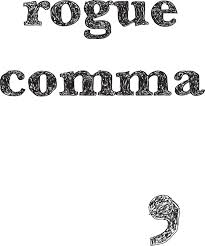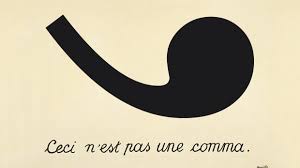One of the greatest challenges I face as a person who occasionally writes things is punctuation. Some of it is easy. The period, the question mark and the exclamation mark I pretty much have down. I put them at the and of a sentence, they perform various sentence ending functions, easy stuff. I also have a reasonable grasp on quotation marks and apostrophes and I will occasionally use a colon or semi colon properly although I am just as likely to muck those last two up. The piece of punctuation that gives me the most consternation, however, is the lowly comma. I hate commas. I despise them. I wish there was some way to scourge them entirely from the totality of human writing, place them all into a large box, and jettison them into the sun. Okay, so the hyperbole is a bit thick, but this is the comma we’re talking about here. It deserves it.
 According to the sages over there at Wikipedia we have Aristophanes of Byzantium to thank for introducing the concept of the comma to the human masses. It should be noted that this of course is not the famous Aristophanes who wrote all those plays that I like (which is good because it would be a shame to have to hate that guy) but rather some ancient Greek “critic, scholar, and grammarian” (read punctilious grammar nazi). Aristophanes of Byzantium invented the concept of the comma (Greek komma) as an indicator of when breaths should be taken when a text was being read aloud. Somewhere along the line someone else (lets call him Billious Grammaticus Confusious or simply “Bill”) decided that the comma should also become super complicated and that its use should be the cause of much confusion and red pen circles for all.
According to the sages over there at Wikipedia we have Aristophanes of Byzantium to thank for introducing the concept of the comma to the human masses. It should be noted that this of course is not the famous Aristophanes who wrote all those plays that I like (which is good because it would be a shame to have to hate that guy) but rather some ancient Greek “critic, scholar, and grammarian” (read punctilious grammar nazi). Aristophanes of Byzantium invented the concept of the comma (Greek komma) as an indicator of when breaths should be taken when a text was being read aloud. Somewhere along the line someone else (lets call him Billious Grammaticus Confusious or simply “Bill”) decided that the comma should also become super complicated and that its use should be the cause of much confusion and red pen circles for all.
Now don’t get me wrong, I understand that commas are possibly important. In the book Eats, Shoots and Leaves Lynne Truss points out in her explanation of the title that the comma is the difference between a homicidal mass murdering bear, and one who is simply well fed. She also spends a lot of time nit picking about little linguistic rules and being, in my humble opinion, a little too resistant to the changing forms of the English language. I come from the school of popular usage and I figure that as long as communication is happening, it’s all cricket. There certainly are rules for comma use. A quick Google search brought up dozens of them from the simple “use a comma to separate the elements in a series” to the more arcane (and I’m loosely paraphrasing here) “use the comma only when joining the subjunctive adenoid to the adjudicative prehensile gerund of the verbular noun phrase, but not before a verb or after a verb and only on Tuesday, Thursday, Saturday and alternate Fridays and then only if the relative humidity is less than or roughly equal to the mean velocity of an unladen swallow.” The guide did not specify African or European.
 I’ve also noticed that the comma, more than other types of punctuation, seems to be a matter of personal taste. When I was in university the first time, I was on a constant comma use yo-yo. If I put them in, invariably the professor would circle them with angry red pen and demand they be taken out. The next semester, thinking I was learning from my mistakes like a good lad, I would be a little more sparing. The angry circles then reappeared proclaiming that commas were missing. :\ I learned two things from this: I have no fracking idea what I am doing when it comes to commas, and the English department is full of complete nuts who have way too many red pens.
I’ve also noticed that the comma, more than other types of punctuation, seems to be a matter of personal taste. When I was in university the first time, I was on a constant comma use yo-yo. If I put them in, invariably the professor would circle them with angry red pen and demand they be taken out. The next semester, thinking I was learning from my mistakes like a good lad, I would be a little more sparing. The angry circles then reappeared proclaiming that commas were missing. :\ I learned two things from this: I have no fracking idea what I am doing when it comes to commas, and the English department is full of complete nuts who have way too many red pens.
Perhaps I have been unfair to the comma. Maybe the issue here isn’t that comma use is confusing, maybe its that I am simply not literate. I’ve worried about this before. FYI the UofW got back to me on this and it seems that I am indeed literate (barely) but I digress. When I write I usually ignore the rules and just try and make it “sound right.” When I was a kid they didn’t really teach things like grammar and punctuation so over the years I’ve just had to kind of muddle it out. So telling me to “use a comma before a coordinating conjunction that joins independent clauses” is basically tantamount to telling me that my wizwigular ferupmtu needs to be gerroflgated. This seems silly to me, rather like giving a kid one of those fancy castle Lego sets, telling her to build it, then tossing the instructions in a rubbish bin but that’s a whole other silly directionless rant. Best to keep it to just the one.
I will concede that the comma does have one redeeming feature; it resembles a paisley and I am awfully fond of paisleys. Thus I think that perhaps the comma, in the end, is purely decorative and maybe I will start using it as such. I can decorate my sentences with pretty little paisleys that will fill anyone who reads them with aesthetic bliss. Perhaps I can explore the sublimity of the comma or its visual relation to other punctuation marks and then years from now when I a dismal homeless failure who failed all of his exams I will have a great story to tell, and something to rant about. I guess it’s probably just best to keep muddling through like some kind of modern day Don Quixote jousting with every perspective comma I meet and hoping that at least some of the time I get it more or less right.
Enjoy your weekend,
D.

Wow, looks great, particularly the end. I had been looking for that topic for a couple of times throughout the
nest, however there was not anything precious. So happy to attain your post
in the end. I’m keen on that theme, and I want to be always aware of the most recent news.
That’s a joy to read your post and finally clarify the issue myself.